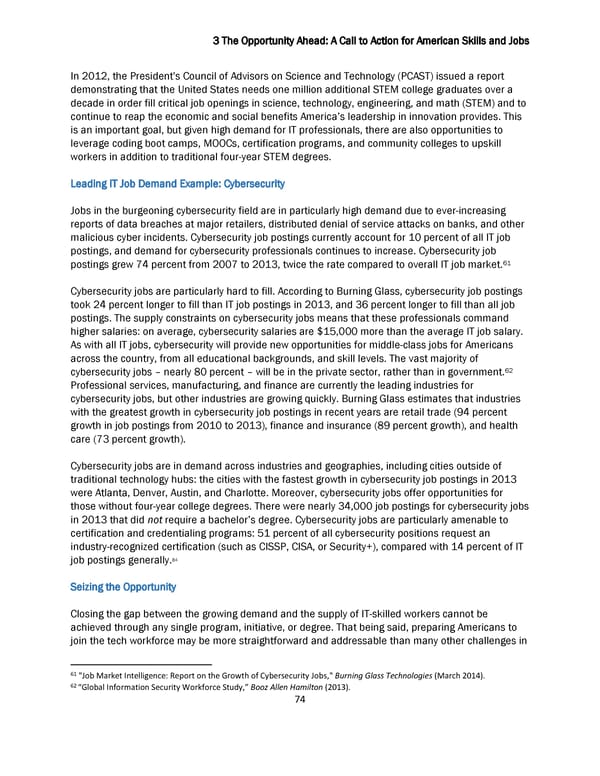3 The Opportunity Ahead: A Call to Action for American Skills and Jobs In 2012, the President's Council of Advisors on Science and Technology (PCAST) issued a report demonstrating that the United States needs one million additional STEM college graduates over a decade in order fill critical job openings in science, technology, engineering, and math (STEM) and to continue to reap the economic and social benefits America’s leadership in innovation provides. This is an important goal, but given high demand for IT professionals, there are also opportunities to leverage coding boot camps, MOOCs, certification programs, and community colleges to upskill workers in addition to traditional four-year STEM degrees. Leading IT Job Demand Example: Cybersecurity Jobs in the burgeoning cybersecurity field are in particularly high demand due to ever-increasing reports of data breaches at major retailers, distributed denial of service attacks on banks, and other malicious cyber incidents. Cybersecurity job postings currently account for 10 percent of all IT job postings, and demand for cybersecurity professionals continues to increase. Cybersecurity job postings grew 74 percent from 2007 to 2013, twice the rate compared to overall IT job market.61 Cybersecurity jobs are particularly hard to fill. According to Burning Glass, cybersecurity job postings took 24 percent longer to fill than IT job postings in 2013, and 36 percent longer to fill than all job postings. The supply constraints on cybersecurity jobs means that these professionals command higher salaries: on average, cybersecurity salaries are $15,000 more than the average IT job salary. As with all IT jobs, cybersecurity will provide new opportunities for middle-class jobs for Americans across the country, from all educational backgrounds, and skill levels. The vast majority of cybersecurity jobs – nearly 80 percent – will be in the private sector, rather than in government.62 Professional services, manufacturing, and finance are currently the leading industries for cybersecurity jobs, but other industries are growing quickly. Burning Glass estimates that industries with the greatest growth in cybersecurity job postings in recent years are retail trade (94 percent growth in job postings from 2010 to 2013), finance and insurance (89 percent growth), and health care (73 percent growth). Cybersecurity jobs are in demand across industries and geographies, including cities outside of traditional technology hubs: the cities with the fastest growth in cybersecurity job postings in 2013 were Atlanta, Denver, Austin, and Charlotte. Moreover, cybersecurity jobs offer opportunities for those without four-year college degrees. There were nearly 34,000 job postings for cybersecurity jobs in 2013 that did not require a bachelor’s degree. Cybersecurity jobs are particularly amenable to certification and credentialing programs: 51 percent of all cybersecurity positions request an industry-recognized certification (such as CISSP, CISA, or Security+), compared with 14 percent of IT job postings generally.84 Seizing the Opportunity Closing the gap between the growing demand and the supply of IT-skilled workers cannot be achieved through any single program, initiative, or degree. That being said, preparing Americans to join the tech workforce may be more straightforward and addressable than many other challenges in 61 "Job Market Intelligence: Report on the Growth of Cybersecurity Jobs," Burning Glass Technologies (March 2014). 62 “Global Information Security Workforce Study,” Booz Allen Hamilton (2013). 74
 Biden Ready to Work White Paper 7/22/14 Page 73 Page 75
Biden Ready to Work White Paper 7/22/14 Page 73 Page 75